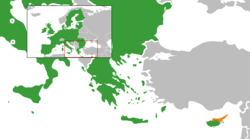Northern Cyprus and the European Union
 |
|
European Union |
Northern Cyprus |
|---|---|
Turkish Cypriots and the European Union have somewhat strained relations because the European Union (EU) does not recognise the self-declared Turkish Republic of Northern Cyprus.
Legal situation
Due to the Cyprus dispute, TRNC is recognized only by the EU candidate state Turkey. All other countries recognise the Republic of Cyprus, an EU member state, as the only legitimate government for the whole island. However the Republic of Cyprus de facto controls only the south of the island while the TRNC government controls the north.
Due to this dispute, northern Cyprus is de jure part of the EU by virtue of de jure being part of the Republic of Cyprus. It was hoped that the accession of the south in 2004 would provide the catalyst for unification so that a unitary state of Greek Cypriots and Turkish Cypriots could join the EU on 1 May 2004. In the end, Turkish Cypriots supported reunification, also because it would allow them to join the EU.[1] However, the unification plan was voted down by the Greek Cypriots and Cyprus joined the EU in the face of the Republic of Cyprus.
Status in the EU
As of 2016, the EU recognises the north as being outside the control of the Greek Cypriot-led government of the Republic and hence is temporarily exempt from EU legislation. The euro also does not officially circulate in the north (although it does have widespread usage) and the Schengen agreement is not in effect in Cyprus due to complications in security at the external border to the north. The free movement of goods, capital, services and people is also not in effect.
However, seats in the European Parliament are allocated based on the population of both north and south Cyprus together. Due to the problems in getting Turkish Cypriots to vote, this has been criticised and there have been proposals to have observer members direct from the north to sit in Parliament in order to represent those citizens.[2]
Naturalised citizens of TRNC or foreigners carrying a passport stamped by TRNC authorities may be refused entry by the Republic of Cyprus or Greece,[3] although after the accession of the Republic of Cyprus to the EU such restrictions have been eased following confidence-building measures between Athens and Ankara and the partial opening of the UN-controlled line by TRNC authorities. The Republic of Cyprus also allows passage across the Green Line from the part of Nicosia that it controls, as well as a few other selected crossing points, since TRNC does not leave entry stamps in the passport for such visits. Since May 2004 some tourists have taken to flying to the Republic of Cyprus directly then crossing the green line to holiday in northern Cyprus.[4]
Trade
In wake of the April 2004 referendum on unification, and the support of the Turkish Cypriot community for the plan, the European Union made pledges towards ending the isolation of northern Cyprus. The proposal for trade[5] between the EU and the Turkish Cypriots was never implemented due to opposition from the Greek Cypriots, who argue that trade would amount to indirect recognition of the TRNC.
Aid programme
The EU has assisted the Turkish Cypriots towards their development and preparation to apply EU law, when reunification would mean the application of EU law throughout Cyprus. Through the Financial Aid Regulation,[6] the EU has funded infrastructure projects, civil society and has provided training on EU law. To manage the interaction with the EU, the Turkish Cypriots have introduced a series of institutions, such as the EU Coordination office.[7]
Green Line Regulation
The Green Line Regulation[8] has been implemented to regulate movement through the 'Green line', the border that separates Greek Cypriot and Turkish Cypriot areas, and to help the economic development of the Turkish Cypriots. In order to avoid recognising the TRNC by implication, The European Commission has dealt with the Turkish Cypriot Chamber of Commerce rather than ministerial authorities, which would have been the norm. This offered the chamber an important role in the relations with the EU.[9]
See also
References
- ↑ "The European Union and Cyprus: The Awkward Partnership". EurActiv.com. Retrieved 16 March 2016.
- ↑ "MEPs consider Turkish Cypriot observers in EU parliament". Retrieved 16 March 2016.
- ↑ "Visa requirements for Cyprus". Retrieved 16 March 2016.
- ↑ "Direct Traveller Flights Information". Direct Traveller - Tailor Made Holidays. Retrieved 16 March 2016.
- ↑ http://eur-lex.europa.eu/LexUriServ/LexUriServ.do?uri=COM:2004:0466:FIN:EN:PDF
- ↑ "Aid Programme for the Turkish Cypriot community". Retrieved 16 March 2016.
- ↑ "The Europeanisation of Contested Statehood". Retrieved 16 March 2016.
- ↑ http://eur-lex.europa.eu/LexUriServ/LexUriServ.do?uri=OJ:L:2004:206:0051:0056:EN:PDF
- ↑ "Comparative European Politics - Abstract of article: A model of /`contested/' Europeanization: The European Union and the Turkish-Cypriot administration". Retrieved 16 March 2016.
